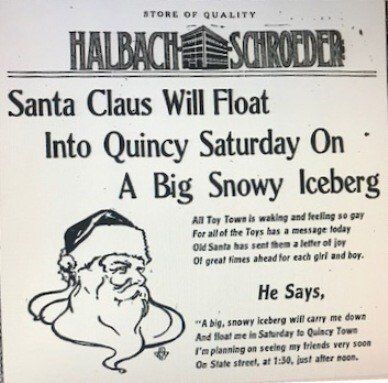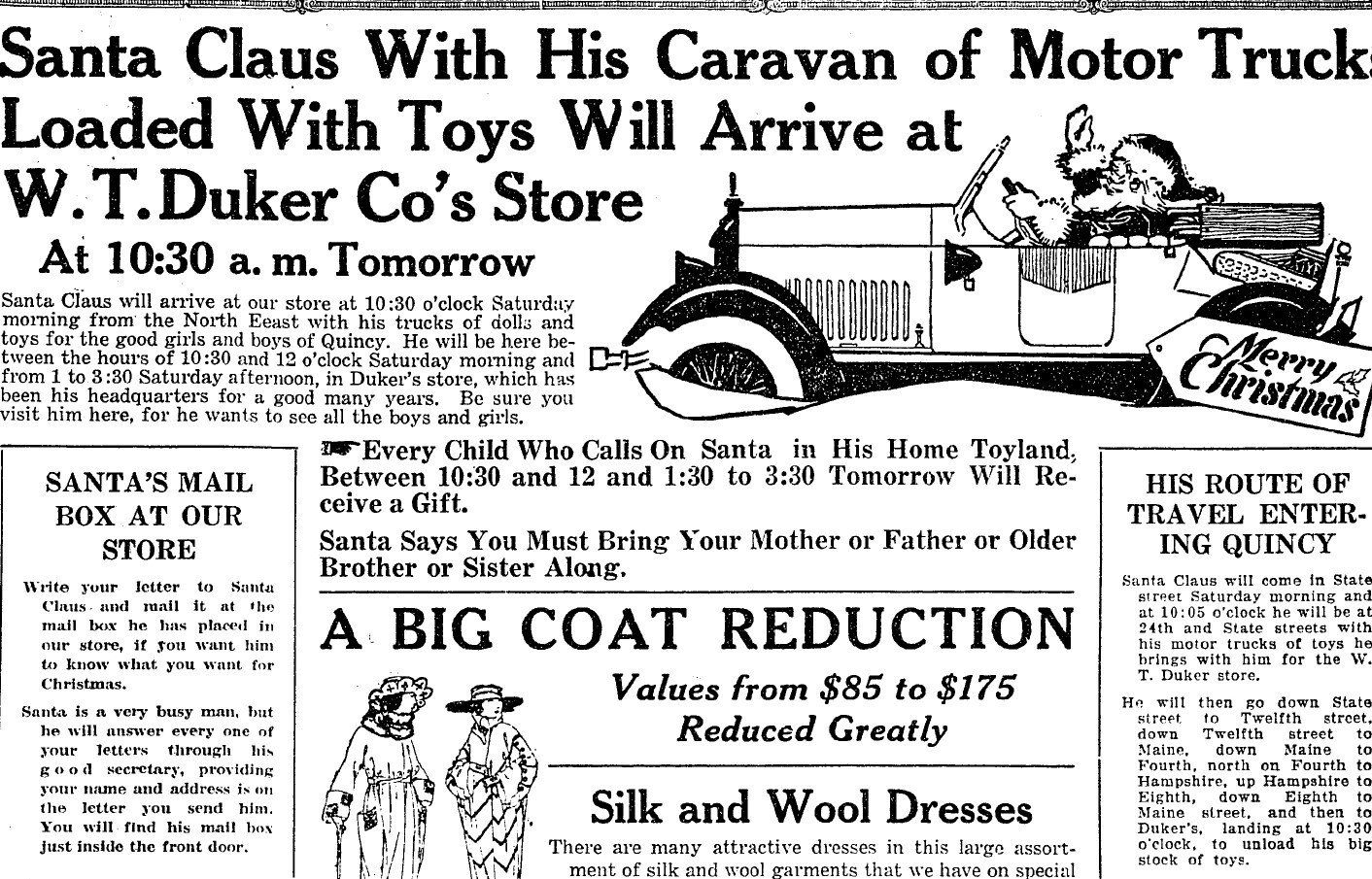Out on the Town in Quincy: November 1921

Santa ad for Halbach Schroeder Department Store which said he would arrive on a snowy iceberg.
(Courtesy of Quincy Public Library Newspaper Archive)
Shoppers walking east on the south side of Maine Street one hundred years ago would have enjoyed temperatures in the 50s in early November. Mothers stopped at Quincy Photo Supply at 412 Maine to pick up their baby pictures for submission to The Whig Journal, which published baby photos every Sunday. As they enter State Bank at 424, shoppers might have expressed relief that the newspapers had not reported any more smallpox cases since the November 1 story about three children in one family contracted it. Dr. John Pollard of the Public Health Board had the children and mother moved to the “isolation hospital” in Gardner Park and ordered the vaccination of all students at Franklin School, where the children attended. The School Board in turn required Franklin students to either show proof of vaccination, get vaccinated, or stay home. Doctors’ offices were busy giving vaccinations. The November 11, 1921 Quincy Daily Herald praised Pollard’s “prompt and intelligent action” and reported that of 420 pupils, “only five or six…families have refused to have their children vaccinated.”
Continuing down the street, the shoppers could stop in the Comstock Castle Stove Co. at 432 on the corner to look at the latest stoves. Outside, as they wait for the streetcar to pass, they might share opinions about the five-globe cluster lamps lighting the city’s business areas. Mayor O’Brien favored replacing them with one-bulb lamps as a cost-cutting measure. Many businessmen preferred the look and brighter light of the five-globes. According to the November 11 Quincy Daily Herald, the Retail Merchants Association adopted a resolution objecting to the change, stating it “would put Quincy in a small-town class.”
Halbach-Schroeder, one of Quincy’s biggest department stores at 500 Maine, was next for the shoppers. They had a long list and at least an hour to shop. For a total of $14.52 they could have: two boys’ sweater coats, three men’s sweaters, two cast iron skillets, two 6-quart aluminum preserve kettles, two yards of outing flannel for nightgowns, four yards of muslin for dress patterns and for filtering homemade apple juice, two hemstitched huck scarves, six handkerchiefs, four dozen dress fasteners, some Colonial glassware, a celery tray, spoon tray, creamer, five compotes, two fruit bowls, a 13-piece embroidered luncheon set, four bath towels, ten Joy laundry soap bars, and twelve bars of Palmolive soap. No sales tax as only West Virginia had sales tax. There was however a war tax on certain events to help pay the cost of the Great War.
Paying a delivery charge and leaving, the next stop was two stores east at Monanteras’ Candy shop for some of the new Baby Ruth candy bars. Anyone on 5th and Maine at 11:30 am November 4 would have seen a parade from 5th to 8th street and then on to Hampshire. The high school band led the way, followed by members of the Rotary, Lions, and Kiwanis clubs carrying banners promoting their “R-L-K Frolics” vaudeville show that Friday night and Saturday at the Empire Theater on 8th Street. Proceeds from the shows would help fund a proposed free children’s dental clinic.
Lady shoppers would have stopped at Crooks Brothers Millinery at 514 Maine to admire the trimmed hats on display surrounding the “Saturday Sale” sign in the west window. Also in stock were misses’ and children’s beaver hats, touted by Crooks as “the Millinery sensation of the season!” Heading toward Crum’s boot shop at 524 they see “CLOSED ARMISTICE DAY” signs in store windows. On November 5, President Harding declared November 11 a national holiday. He would attend a ceremony at Arlington National Cemetery at the new Tomb of the Unknown Soldier. Downtown Quincy would be deserted that Friday, schools closed, and special morning church services around the city. At 10:45 all churches rang bells for fifteen minutes, stopping at “the eleventh hour of the eleventh day” as the Arlington ceremony commenced.
In the Miller & Arthur Drug Store, 520 Maine, shoppers could read about the many entertainment options on Armistice Day. There would be some outdoor activities despite temperatures in the low 30s. An afternoon football game had been scheduled between a Pittsfield team and the Quincy All-Stars at Athletic Park. However, Quincy players voted to cancel the contest because of Pittsfield’s left end, Buss Davis. He was Black. Phone calls between the two coaches resulted in a compromise: Davis would not play unless a teammate was injured. Bad news on that Armistice Day for Davis, who had served in the war. Quincy won, and Davis did play “a clean game…taking his spills as part of the game.” Also outdoors was the American Legion’s rodeo at League Park: “Admission 55 cents, war tax included.” The bulldogging, shooting, roping, and riding would continue through Sunday. The Legion was also sponsoring an 8:00 dance at the Highland Park pavilion with a cabaret in the basement. This event was war taxed. “Owners of dance halls,” a Quincy Daily Herald article stated that day, “ [are] required by law to [print] separate tickets for men, women, and couples and to keep a permanent record of such admission for inspection by the revenue office.” Another federal law affected the dance—the Volstead Act. Prohibition was in its second year. If all drinks were legal that night, then the revelers may have had Noxall Dealcoholized Beer, Ruff’s Pure Malt Extract, or some other “near beer.”
Even shoppers inside Kresge’s on 526 Maine and Meyer-Wilms Dry Goods and Notions on 532 would have stepped outside to see Santa Claus coming to Halbach-Schroeder. The store’s notice said he would “float” in on a “big snowy iceberg.” Much of the town got to see him as he traveled from 36th and State to 24th and Maine, from there straight through downtown to 4th Street, waving at the crowds of parents and cheering youngsters gathered outside the store, across the street, and in Washington Park. He brought a gift for every child. It was quite a time in Quincy.
SOURCES
“Smallpox Cases Call For Action By Health Board.” The Quincy Whig-Journal, November 1, 1921, p. 3.
“Practical Example Of Work Of Health Board.” The Quincy Daily Herald, November 11, 1921, p. 6.
“Merchants Want Same Electroliers.” The Quincy Daily Herald, November 9, 1921, p. 3.
“Merchants Want Five Light Electroliers.” The Quincy Daily Herald, November 11, 1921, p. 12.
Halbach-Schroeder Co. ads. The Quincy Daily Herald, November 2 and 4, 1921, p. 3 both dates.
“Quincy High Band Heads R-L-K Parade.” The Quincy Daily Herald, November 5, 1921, p. 16.
Crooks Brothers ad. The Quincy Daily Herald, November 11, 1921, p. 11.
“Church Bells Will Toll on Armistice Day.” The Quincy Whig-Journal, November 8, 1921, p. 3.
“Will Observe Armistice Day, Close Stores.” The Quincy Whig-Journal, November 7, 1921, p. 3.
“Question of Playing Negro Threatens Armistice Day Game.” The Quincy Daily Herald, November 11, 1921, p. 10.
“Reach Agreement On Armistice Day Football Game.” The Quincy Daily Herald, November 11, 1921, p. 12.
“All-Stars May Meet Pittsfield Again.” The Quincy Whig-Journal, November 13, 1921, p. 6.
“Montana-Wyoming Round-Up,” (rodeo ad). The Quincy Daily Herald, November 11, 1921, p. 5.
“The Corner On The Square,” (rodeo report). The Quincy Daily Herald, November 16, 1921, p. 6.
“Two Orchestras to Play at Armistice Day Carnival Dance.” The Quincy Whig-Journal, November 11, 1921, p. 4.
Ruff’s Co. ad. The Quincy Whig-Journal, November 13, 1921, p. 6.
“Santa Claus Will Float Into Quincy On Saturday On A Big Snowy Iceberg.” The Quincy Daily Journal, November 11, 1921, p. 16.
“War Tax At Dances No Longer Figured By Male Admission.” The Quincy Daily Herald, November 11, 1921, 12.
The Historical Society of Quincy and Adams County is a non-profit organization dedicated to preserving local history. This column’s authors are society members and historians. The Herald-Whig’s website,
www.whig.com
, carries each column and includes sources.
For information visit hsqac.org or call 217-222-1835.

W. T. Duker Department Store ad for a visit by Santa at 529 Maine on November 19. He was escorted by the town's orphans. (Courtesy of Quincy Public Library Newspaper Archive)






